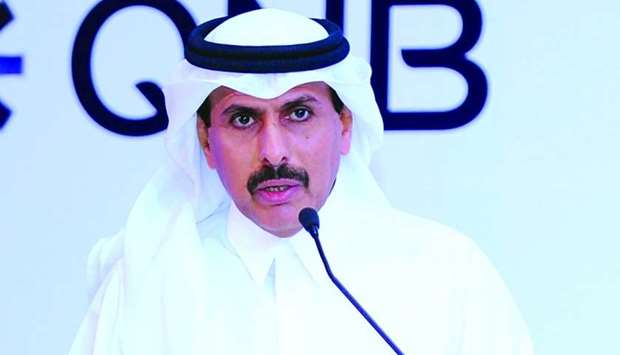The Qatar Central Bank (QCB) has adequate reserves to defend the Qatari riyal as its international reserves are twice the monetary base; indicating its ability to inject dollar liquidity.
"The available reserves are more than enough whether to defend the Qatari riyal or for monetary policy tools," QCB Governor HE Sheikh Abdulla bin Saoud al-Thani told Euromoney Conference, which concluded yesterday.
The monetary base is the total money issued in addition to all the deposits of local banks including the required reserves which cannot be withdrawn.
Highlighting that the central bank's international reserves and foreign currency liquidity were eight times the issued currency against the stipulated 100%; he said these assets were still a small fraction of the country's total overseas assets.
Recently, BMI, a Fitch company, said Qatar, which can easily defend its foreign exchange peg with the greenback, has the ability to inject ample dollar liquidity.
Finding no "significant" risks of a forced break in the riyal's peg to the dollar – kept at QR3.64 since 2001 – BMI said Qatar's foreign exchange reserves, while having narrowed since the outbreak of the crisis, still represent over 12 months of imports.
Total assets of the commercial banks in Qatar grew about 13% year-on-year in the first nine months of this year with credit off-take also expanding at a similar proportion, while deposits reported about 18% growth, Sheikh Abdulla said.
The overall capital adequacy of the banking sector stood at more than 15% and the non-performing loans ratio was at 1.5%, reflecting the quality of the assets of the commercial lenders.
Referring to the economic blockade, the central bank governor said Qatar was able to overcome the "unjust" siege by some of its neighbours by strategising itself in supporting the private sector and finding alternate alliances to sustain the supply chain in the economy.
On the impending general budget for 2018, Sheikh Abdulla said it would not only support economic diversification but also would see an increase in government spending on all projects and services.
On Tuesday, Finance Minister HE Ali Sherif al-Emadi said Qatar has made a conservative oil price assumption of $45 a barrel in the budget that would focus on the private sector, infrastructure and those projects to achieve self-sufficiency in the country. Qatar's domestic production of dairy products was about 8% to 9% before the Gulf crisis, which then rose to more than 40% in the first six months of the blockade and aims to be 100% self-sufficient by June 2018. The government has accorded utmost priority for dairy and poultry farming projects and HE the Prime Minister is reviewing those projects on a daily basis.
The QCB governor said Qatari economy remained strong and the inflation remained "stable". Qatar's cost of living, based on consumer price index, edged up 0.3% month-on-month this October. On a yearly basis, it was up 0.2%.
All infrastructure projects including roads, bridges and stadiums are being implemented according to the plan, and would be completed on time, he said.
Mohsin Mujtaba, director of product and market development at the Qatar Stock Exchange, said the country should look beyond 2022 and the FIFA World Cup.
"The infrastructure story will reach its conclusion, and Qatar will accelerate its progress towards its 2030 goal of becoming a knowledge-based economy, moving towards a technology-driven lifestyle and industry,” he said.


